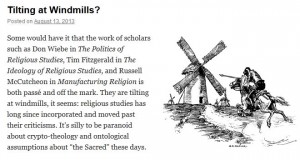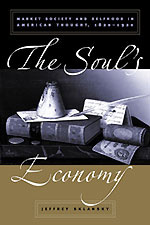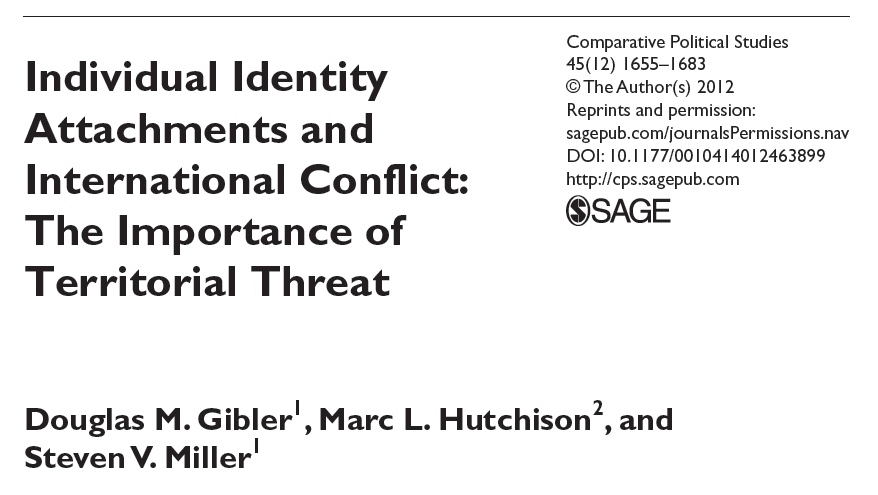 Find more of Craig Martin’s blogs at the Bulletin here as well as his own blog.
Find more of Craig Martin’s blogs at the Bulletin here as well as his own blog.

A Peer Reviewed Blog
“On the Spot” backs members of Culture on the Edge into a corner to talk about their backgrounds, their ongoing work, and what might be gained by an alternative understanding of how identity works.
 Q: Craig, the shift that we’re all making at Culture on the Edge – from describing identities that either do or do not complement each other to studying the historically situated identification practices that make it possible to claim an identity – is not all that typical for scholars of religion. Do you agree? And if so, then what did you do your early work on and when (and why) did you start to make this theoretical shift?
Q: Craig, the shift that we’re all making at Culture on the Edge – from describing identities that either do or do not complement each other to studying the historically situated identification practices that make it possible to claim an identity – is not all that typical for scholars of religion. Do you agree? And if so, then what did you do your early work on and when (and why) did you start to make this theoretical shift?
A: I find that a lot of scholars claim that there is, of course, no essence to any religious or cultural tradition, but who then go on to talk as if there was. Continue reading “On the Spot with Craig Martin”
 Interested in Craig Martin‘s thoughts on future directions in the sociology of religion — at least why he thinks some others’ thoughts are sadly inadequate? Click here.
Interested in Craig Martin‘s thoughts on future directions in the sociology of religion — at least why he thinks some others’ thoughts are sadly inadequate? Click here.
 In “The Ghost Rapes of Bolivia,” a story that recently ran on Vice.com, Jean Friedman-Rudovsky reports on a series of rapes that took place in Manitoba Colony, Bolivia, as well as the reaction of the community. According to the story, some men were breaking into houses, drugging, and raping women who—apparently because of the drugs—could not remember the event. Continue reading “Tenuous Connections”
In “The Ghost Rapes of Bolivia,” a story that recently ran on Vice.com, Jean Friedman-Rudovsky reports on a series of rapes that took place in Manitoba Colony, Bolivia, as well as the reaction of the community. According to the story, some men were breaking into houses, drugging, and raping women who—apparently because of the drugs—could not remember the event. Continue reading “Tenuous Connections”
 In Sex/Gender: Biology in a Social World, Anne Fausto-Sterling provides us with an interesting metaphor with which to think about the nature/nurture debate. Sometimes the discussion is framed in terms of how much nature and nurture each contribute, as if they’re taking turns filling a bucket. Imagine a 100 gallon bucket:
In Sex/Gender: Biology in a Social World, Anne Fausto-Sterling provides us with an interesting metaphor with which to think about the nature/nurture debate. Sometimes the discussion is framed in terms of how much nature and nurture each contribute, as if they’re taking turns filling a bucket. Imagine a 100 gallon bucket:
Suppose two people (oh call one Mr. Nature and the other Ms. Nurture) are filling up that bucket with separate hoses. If Mr. Nature added 70 gallons and Ms Nurture 30, then we could say that the 100 gallons is due 70 percent to nature and 30 percent to nurture. (113) Continue reading “Discourse All the Way Down”
 In The Soul’s Economy: Market Society and Selfhood in American Thought, 1820-1920, Jeffrey Sklansky argues that there’s a fundamental shift in American views on freedom and self-determination in the nineteenth century. While the American revolutionaries thought of freedom and self-determination as tied to property and wealth—i.e., material interests—with the rise of romantic authors like Ralph Waldo Emerson and others, freedom and self-determination shifted to some sort of interior freedom of thought.
In The Soul’s Economy: Market Society and Selfhood in American Thought, 1820-1920, Jeffrey Sklansky argues that there’s a fundamental shift in American views on freedom and self-determination in the nineteenth century. While the American revolutionaries thought of freedom and self-determination as tied to property and wealth—i.e., material interests—with the rise of romantic authors like Ralph Waldo Emerson and others, freedom and self-determination shifted to some sort of interior freedom of thought.
[I]n severing the bond between selfhood—or, in the language of the early republic, independence or liberty or virtue—and property, these writers did not necessarily question the transformation of self-employed farming and artisan families into propertyless wage earners. By identifying moral agency with the “inner self” rather than with political and economic sovereignty, they effectively redefined the founding ideals of freedom and democracy in ways that did not directly conflict with the revolution in property relations. (37)
According to Sklansky, they inadvertently “provided ideological cover for class inequality” (72).
Is your body free? Or just your soul?

The interview with Reza Aslan on FOX News is already internet famous. (You can watch it here if you haven’t already seen it.) Continue reading “Identity Claims Play Out on FOX”

I’ve come up with a little rule of thumb I try to keep in mind when coming across a piece of data that, prima facie, might appear anomalous. Instead of thinking “weird; how do I explain this?,” I force myself to ask, “what set of assumptions or grid of classification makes this anomalous?” Continue reading “Rule of Thumb: Forget Anomalies”
 Some scholars of religion talk as if cultural stuff—icons, myths, rituals, practices, ideologies, discourses, etc.—allows practitioners to “express” themselves, their religious beliefs, or simply their “religion.” Other scholars talk as if the use of this cultural stuff has the effect of “constituting” (perhaps by “performing”) themselves, their religious beliefs, or their identity. Continue reading “Religious “Expression”?”
Some scholars of religion talk as if cultural stuff—icons, myths, rituals, practices, ideologies, discourses, etc.—allows practitioners to “express” themselves, their religious beliefs, or simply their “religion.” Other scholars talk as if the use of this cultural stuff has the effect of “constituting” (perhaps by “performing”) themselves, their religious beliefs, or their identity. Continue reading “Religious “Expression”?”

The identifications people make are strategic and context specific, as this article by Gibler, Hutchison, and Miller suggests:
[I]nternational conflict exerts a strong influence on the likelihood and content of individual self-identification, but this effect varies with the type of conflict. Confirming nationalist theories of territorial salience, territorial conflict leads the majority of individuals in targeted countries to identify themselves as citizens of their country. However, individuals in countries that are initiating territorial disputes are more likely to self-identify as members of a particular ethnicity, which provides support for theories connecting domestic salience to ethnic politics.
Being attacked leads you to identify with the nation. But if your nation is the one doing the attacking, all of the sudden you’d rather make alternate identifications …